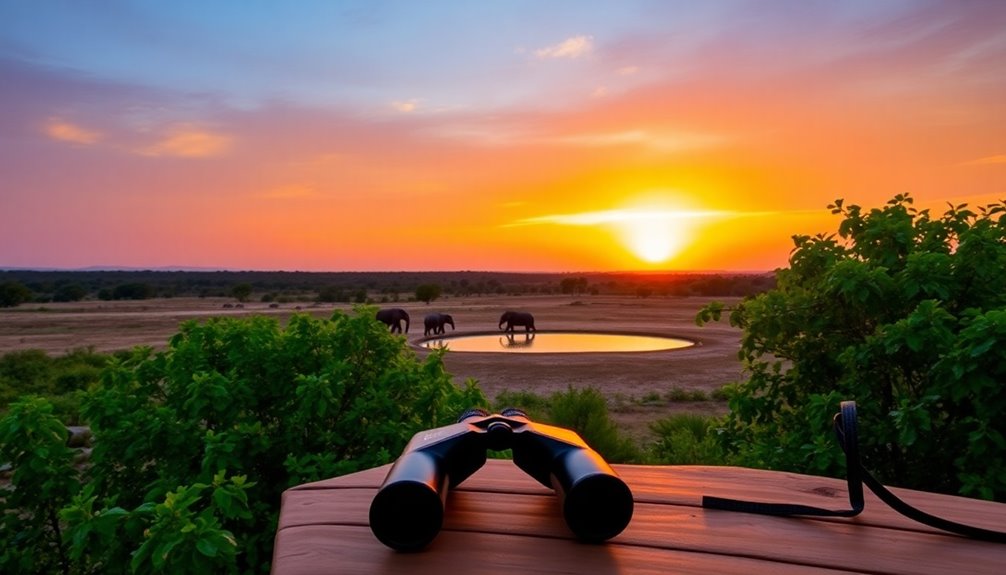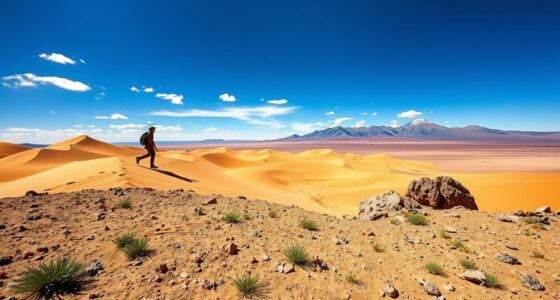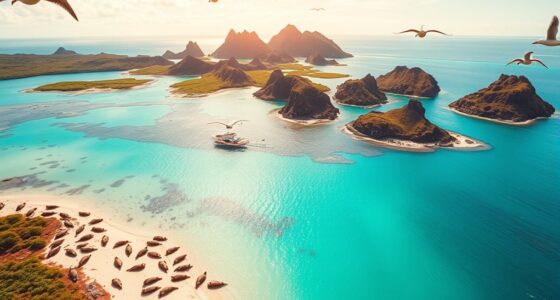You won't want to miss South Africa's top eco-friendly safaris, where breathtaking wildlife encounters and conservation efforts unite. Explore iconic spots like Kruger National Park and Addo Elephant National Park, known for the Big Five and dense elephant populations. Stay in sustainable eco-lodges that reduce waste and support local communities, enhancing your experience. Participate in wildlife rehabilitation programs and community-led projects that promote long-term ecological health. As you plan your unforgettable adventure, consider the best times for wildlife viewing and sustainable travel practices. Keep going to uncover the hidden gems and experiences that await you.
Key Takeaways
- Experience immersive eco-friendly safaris in Kruger National Park, home to the Big Five, while supporting wildlife conservation efforts.
- Stay at eco-lodges that prioritize sustainability through waste reduction, solar energy, and locally sourced materials for an environmentally conscious experience.
- Engage with local communities through cultural exchanges and participate in community-led projects that promote sustainable development and improve livelihoods.
- Join guided wildlife viewing during the dry season (May to September) for optimal animal sightings near water sources, enhancing your safari experience.
- Support rehabilitation programs and anti-poaching initiatives that contribute to habitat preservation and species recovery during your eco-friendly safari adventure.
Introduction
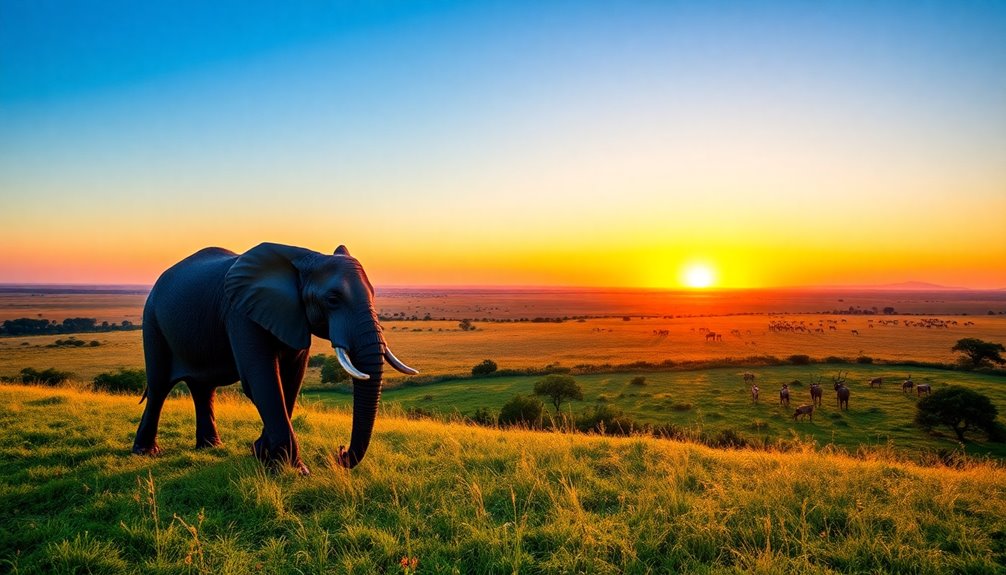
When you think of South Africa, breathtaking biodiversity and stunning landscapes come to mind.
Eco-friendly safaris not only let you experience this natural beauty but also play a crucial role in biodiversity conservation.
Breathtaking Biodiversity and Landscapes
South Africa's breathtaking biodiversity and stunning landscapes invite you to explore a world teeming with life and natural beauty.
From the iconic Kruger National Park, where the Big Five roam freely, to the diverse habitats of the Kalahari Desert and the lush Okavango Delta, each region showcases unique wildlife waiting to be discovered.
Imagine spotting over 600 bird species in the Wetlands or the Cape Floristic Region, a UNESCO World Heritage site.
The Vhembe Biosphere Reserve offers pristine landscapes, supporting endangered species and promoting sustainable tourism.
With protected areas like Addo Elephant National Park, home to one of the densest elephant populations, South Africa's commitment to conservation ensures unforgettable wildlife experiences while respecting the environment.
Biodiversity Conservation Through Tourism
While exploring the stunning landscapes of South Africa, you'll discover how eco-friendly safaris play a vital role in biodiversity conservation.
These experiences generate sustainable income for local communities, incentivizing them to protect natural habitats and wildlife.
Eco-lodges in areas like the Lapalala Reserve are dedicated to wildlife conservation efforts, committing to anti-poaching initiatives and habitat restoration for endangered species like cheetahs.
Your participation in eco-friendly safaris directly supports community projects, such as stove programs that promote sustainable practices.
By engaging with local communities, you'll foster cultural exchanges and empower residents through employment in conservation-focused tourism.
Ultimately, your adventure helps fund wildlife monitoring and anti-poaching patrols, ensuring the long-term ecological health of South Africa's precious ecosystems.
Travel From New York City
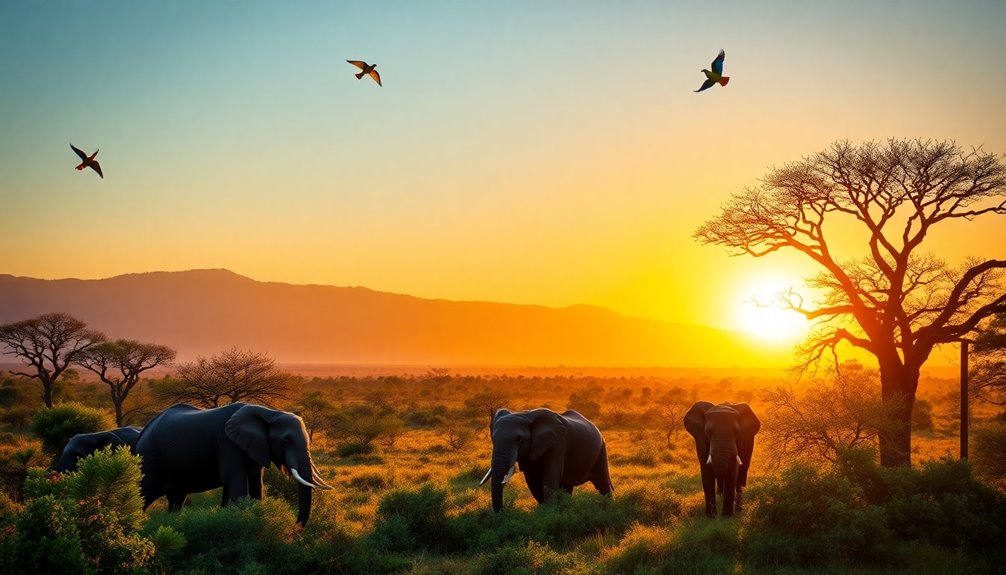
When you're ready to embark on your eco-friendly safari from New York City, consider your flight options to South Africa.
You can easily connect through major hubs like Atlanta or London, making your journey smoother.
Once you arrive, eco-friendly shuttle services can whisk you away to your sustainable lodge and the breathtaking wildlife parks.
Fly From Atlanta to Africa
How can you seamlessly connect your journey from Atlanta to Africa? Start by flying from Atlanta to New York City, which takes just about two hours.
Once in NYC, you'll find major airlines like Delta and American Airlines offering direct flights to various South African cities, including Johannesburg and Cape Town. These international flights typically take 14 to 16 hours, so plan accordingly!
To enjoy an unforgettable eco-friendly safari, it's wise to book your round-trip tickets in advance, with fares ranging from $800 to $1,500.
After landing in South Africa, domestic flights or organized transfers will quickly take you to eco-friendly lodges that emphasize sustainable practices and provide a true conservation experience.
Your adventure awaits!
Fly From London to Johannesburg
Are you ready to embark on a journey from London to Johannesburg?
To fly from London to Johannesburg, you can choose direct flights with British Airways or South African Airways, taking about 11-12 hours. Upon arrival at Johannesburg's O.R. Tambo International Airport, you'll find numerous options for eco-friendly safari adventures throughout South Africa.
If you're traveling from New York City, expect a longer journey with layovers, often exceeding 15 hours. To secure better rates, it's smart to book your flights well in advance.
Plus, don't forget to check for any travel restrictions or health guidelines before you go. Whether you're seeking a sustainable safari or luxury travel, your adventure awaits in South Africa!
Fly From Sydney to Johannesburg
Traveling from Sydney to Johannesburg opens up a world of eco-friendly safari adventures in South Africa. Direct flights, offered by airlines like Qantas and South African Airways, take around 14 to 16 hours, making it a manageable journey.
Upon arriving at Johannesburg's OR Tambo International Airport, you're ideally positioned to explore various sustainable safari destinations, including the renowned Kruger National Park and the Madikwe Game Reserve.
To make the most of your trip, it's wise to book flights well in advance, especially during peak seasons. Once you land, you can easily access eco-friendly lodges through domestic flights or guided tours that prioritize sustainable travel practices.
Your unforgettable safari experience in South Africa is just a flight away!
Eco-Friendly Shuttle Services Available
When you're planning your eco-friendly safari from New York City to South Africa, consider booking an eco-friendly shuttle service that prioritizes sustainability.
These services typically use electric or hybrid vehicles, significantly reducing carbon emissions during your travel. Many operators offer carbon offset programs, allowing you to support reforestation and conservation projects, actively contributing to responsible tourism.
By choosing these shuttles, you're not just reducing your footprint; you're also supporting sustainable initiatives that benefit local communities and wildlife conservation efforts.
Additionally, you'll receive educational materials about sustainable travel practices, enhancing your awareness as you journey. This way, you can enjoy your adventure while ensuring you're making a positive impact on conservation and community.
Wildlife Rehabilitation and Education Programs
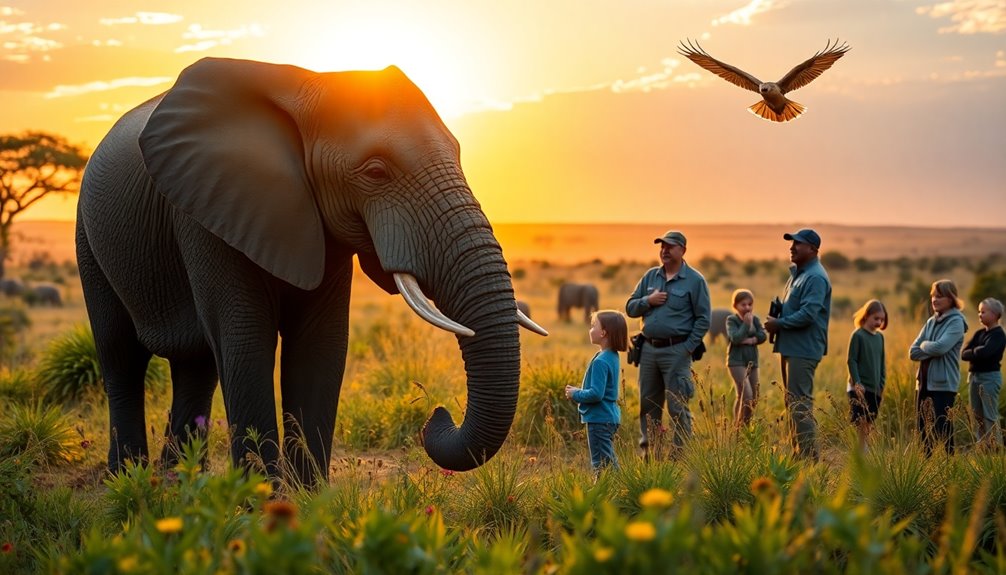
When you participate in wildlife rehabilitation and education programs, you'll discover hands-on workshops that teach you about conservation practices.
You can learn wildlife tracking and photography skills while using sustainable, locally sourced materials.
These experiences not only enhance your safari but also support vital efforts to protect South Africa's diverse ecosystems.
Wildlife Conservation Workshops
Participating in wildlife conservation workshops in South Africa offers a unique opportunity to engage directly with animal rehabilitation and education programs.
You'll gain hands-on training in caring for injured or orphaned wildlife, learning from expert-led sessions provided by local conservation organizations.
These workshops often involve community involvement, fostering relationships that enhance sustainable practices and promote cultural exchange.
You'll participate in fieldwork, which may include monitoring wildlife populations, assisting in habitat restoration, and joining anti-poaching patrols.
By contributing to these programs, not only do you gain valuable knowledge, but you also support conservation funding and awareness, as many initiatives direct profits towards habitat preservation and species recovery projects.
Your experience will leave a lasting impact on both you and the environment.
Wildlife Tracking and Photography Workshops
Wildlife tracking and photography workshops in South Africa provide an immersive experience that connects you with the region's stunning biodiversity.
Led by expert guides, you'll learn wildlife tracking techniques and gain insights into animal behavior while emphasizing the importance of conservation.
Photography workshops enhance your skills in capturing wildlife in their natural habitats, focusing on ethical practices that prioritize the well-being of endangered species.
Many eco-friendly safari lodges incorporate wildlife rehabilitation and education programs, allowing you to engage in meaningful activities like monitoring populations and assisting with habitat restoration.
Sustainable, Locally Sourced Materials
Emphasizing sustainability, many eco-friendly safari lodges in South Africa utilize locally sourced materials in their construction, creating a harmonious blend with the natural environment.
By using natural stones and reclaimed wood, these lodges minimize their environmental impact while supporting the local community.
Wildlife rehabilitation programs often collaborate with these lodges, offering educational experiences that deepen your understanding of conservation efforts.
For instance, lodges like Kwitonda Lodge showcase local volcanic rock and native plants, fostering ecological restoration.
Engaging local artisans for decor not only enhances your stay but also preserves traditional crafts and bolsters the local economy.
Through these sustainable practices, your visit contributes to a positive impact on endangered species and local ecosystems, making your safari truly unforgettable.
Support Local Wildlife Sanctuaries
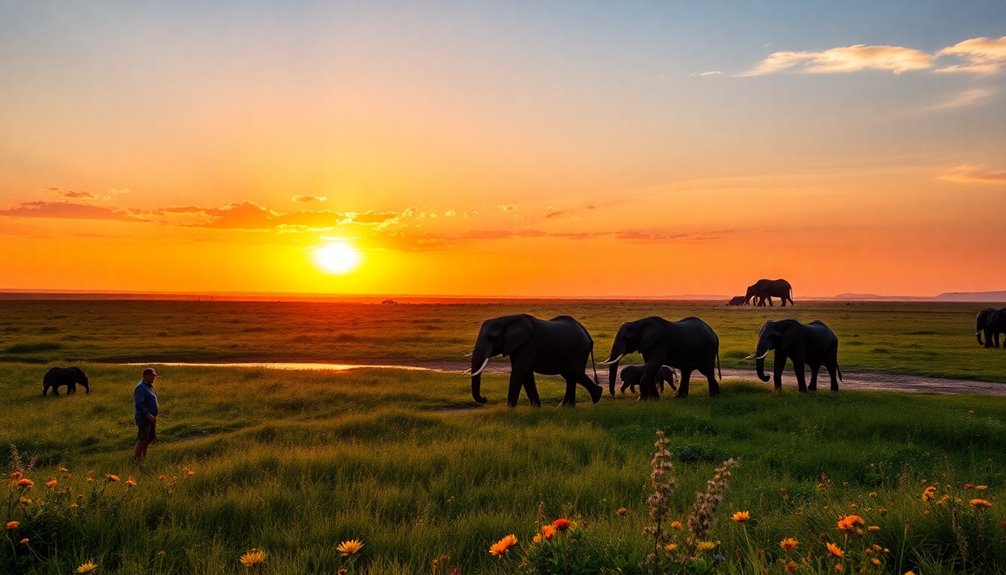
While exploring the breathtaking landscapes of South Africa, you can make a meaningful impact by supporting local wildlife sanctuaries.
These organizations, like the Cheetah Conservation Fund and the Rhino Orphanage, focus on conservation efforts that protect endangered animals and enhance biodiversity.
By visiting these sanctuaries, you contribute to anti-poaching initiatives and rehabilitation programs, ensuring injured or orphaned animals receive the care they need.
Eco-friendly safari lodges, such as those in the Lapalala Wilderness, partner with these sanctuaries, providing immersive experiences that educate you on wildlife preservation.
Your support directly aids local communities and fosters significant improvements in animal populations.
Community-Led Reforestation Projects
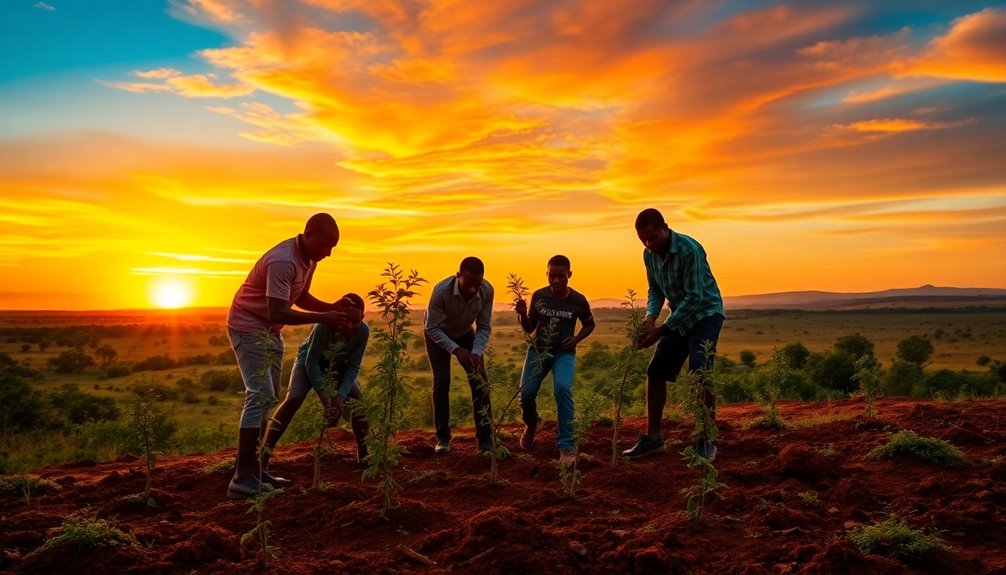
When you explore community-led reforestation projects in South Africa, you'll see how local residents collaborate with the government and NGOs to restore vital ecosystems.
These initiatives not only plant trees but also enhance community livelihoods, ensuring cultural sustainability while combating climate change.
Government and NGO Efforts
Community-led reforestation projects in South Africa are making a significant impact on both the environment and local livelihoods.
The government's commitment to planting over 1 million trees annually highlights their dedication to sustainability practices and combating climate change.
NGOs like Greenpop and Food and Trees for Africa engage local communities in community-driven reforestation efforts, planting over 100,000 trees and empowering people through education and training.
Collaborative projects, such as the South African Green Fund, provide vital funding and resources to support these initiatives.
Community and Cultural Sustainability
Reforestation efforts in South Africa not only restore ecosystems but also empower local communities, making them vital to promoting cultural sustainability.
Community-led reforestation projects, like those in the Vhembe Biosphere Reserve, aim to regenerate 100,000 hectares over the next decade. By engaging locals, these initiatives create sustainable livelihoods, enhancing both resilience and ecological health.
Collaborations with artisans and farmers ensure that reforestation supports economic growth, while eco-lodges contribute by directing a portion of their profits to these efforts. This creates a symbiotic relationship between tourism and conservation.
Educational workshops and awareness campaigns further empower locals, instilling the importance of sustainable practices and preserving their natural environment, fostering a deep sense of ownership and responsibility within the community.
Optimal Months for Wildlife Viewing
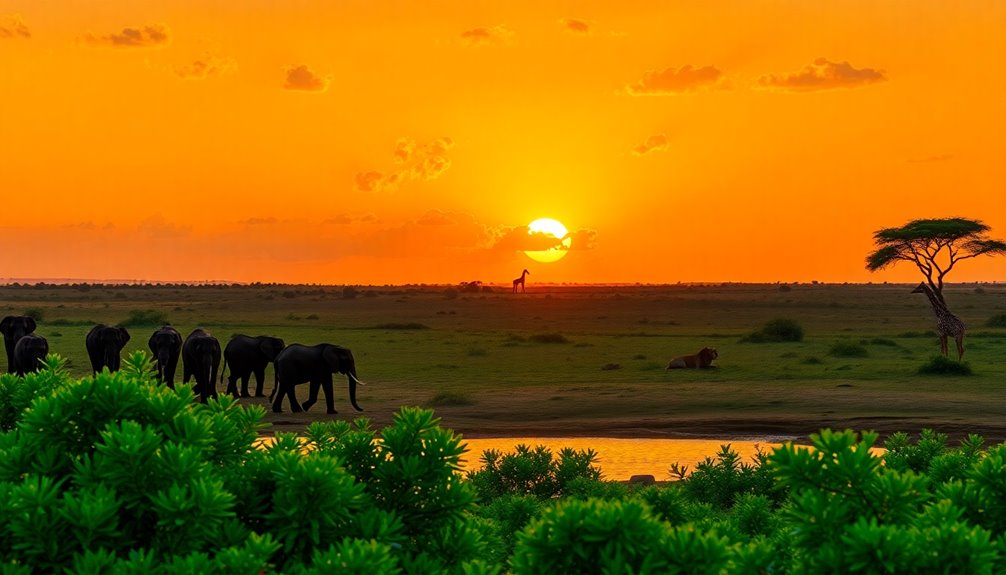
When planning your safari, the best months for wildlife viewing are from May to September, aligning with the dry season.
This time not only makes it easier to spot animals congregating around water sources but also coincides with the migration patterns and seasonal rainfall that can enhance your experience.
Keep in mind that the cooler winter months can bring out more active predators, while spring offers unique opportunities to witness animal behaviors.
Best Months for Wildlife Migrations
Have you ever wondered when the best time is to witness wildlife migrations in South Africa? The ideal months are from May to September, coinciding with the dry season. During this time, animals gather around water sources, making it easier to spot the Big Five in places like Kruger National Park. September is particularly exciting as elephants and lions migrate towards traditional grazing areas. Additionally, taking the time to reflect on past mistakes while planning your trip can enhance your overall experience and ensure you make the most of your safari adventure.
Here's a quick overview:
| Month | Wildlife Activity |
|---|---|
| May | Start of migrations |
| June-August | Optimal conditions for Big Cats |
| September | Annual elephant and lion migration |
| November-March | Peak breeding for migratory birds |
Plan your safari during these months for unforgettable wildlife experiences!
Seasonal Rainfall Patterns
While the dry winter months offer the best opportunities for wildlife viewing, understanding seasonal rainfall patterns can enhance your safari experience in South Africa.
From May to September, during the dry season, animals gather around water sources, making it easier for you to spot the Big Five on game drives. The foliage is less dense, improving visibility, especially in renowned spots like Kruger National Park and Sabi Sand Game Reserve.
Peak months like July and August are ideal, as cooler temperatures keep animals active during the day.
Conversely, October to March brings increased rainfall, leading to lush vegetation that can obscure sightings. However, this period is fantastic for birdwatching with the arrival of migratory species.
How to Make Your Trip More Sustainable
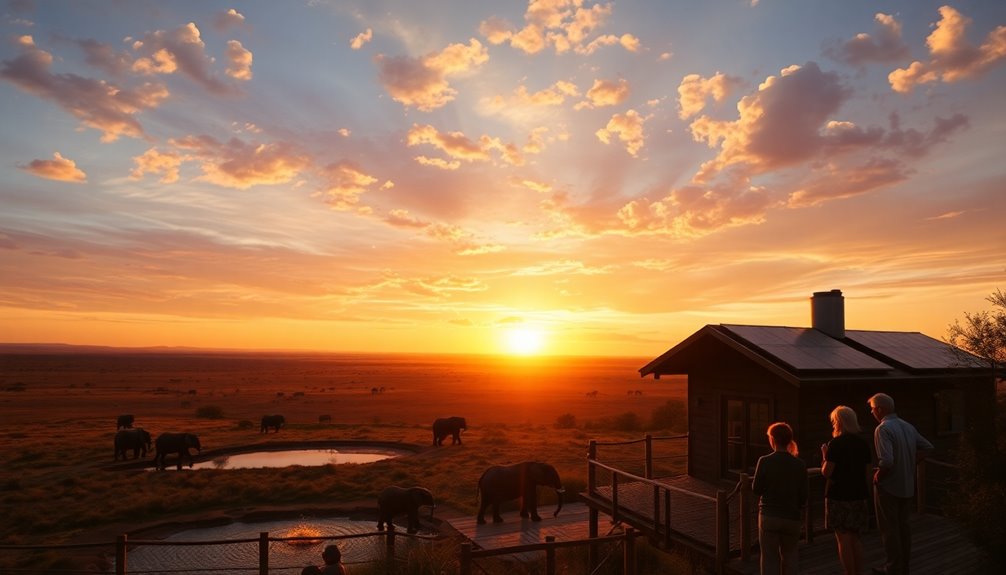
To make your safari trip more sustainable, start by packing biodegradable toiletries and containers to minimize waste.
Consider choosing wildlife-friendly transportation options that reduce your carbon footprint while exploring the stunning landscapes.
These simple changes can significantly enhance your eco-friendly adventure in South Africa.
Biodegradable Toiletries and Containers
Embracing biodegradable toiletries and containers can transform your safari experience into a more sustainable adventure. By opting for biodegradable toiletries like shampoo bars and soap, you help reduce plastic waste and protect local ecosystems.
Choosing travel-sized products in biodegradable containers ensures they decompose without leaving harmful residues behind. Many eco-friendly lodges in South Africa, such as Far & Few Luvhondo, encourage this by providing refillable containers, minimizing single-use plastics.
Additionally, using compostable wet wipes significantly cuts down your environmental impact, as they break down naturally without contributing to landfill waste.
Wildlife-Friendly Transportation Options
When planning your eco-friendly safari, choosing wildlife-friendly transportation options can make a significant difference in reducing your environmental impact.
Opt for solar-powered game drives or electric safari vehicles at eco-lodges to minimize carbon emissions while you encounter wildlife and habitats.
Consider hiring local guides who offer tours on foot or by bicycle, preserving the natural environment and minimizing disturbance to animals.
Utilize shuttle services or shared transportation options provided by lodges to lessen the number of vehicles on the road.
Choose accommodations that offer electric bikes for exploring nearby areas.
Finally, engage in community-based transportation initiatives like shared taxis that support local economies and conservation efforts, contributing to a sustainable travel experience.
Frequently Asked Questions
What Is the Number 1 Safari in South Africa?
When you think about the number 1 safari in South Africa, Kruger National Park often comes to mind.
It's massive, stretching over 7,500 square miles, and offers a chance to see the Big Five in their natural habitat.
You'll love its rich biodiversity, with over 500 bird species and countless mammals.
Whether you choose guided drives or walking safaris, this park provides unforgettable wildlife experiences while promoting conservation and sustainable tourism.
Which Month Is Best for Safari in South Africa?
If you're planning a safari in South Africa, the best months to go are from May to September.
During this dry winter season, wildlife's easier to spot as animals gather around water sources. Peak viewing happens in August and September when the temperatures cool and vegetation thins out.
If you prefer fewer crowds and lower prices, consider traveling in October or April; you'll still enjoy good wildlife sightings during those months.
Is a South African Safari Worth It?
Absolutely, a South African safari's worth it!
You'll experience breathtaking landscapes, diverse wildlife, and unforgettable encounters with the "Big Five." Engaging with knowledgeable guides enhances your understanding of the ecosystems and conservation efforts.
Plus, the variety of activities—from thrilling game drives to serene nature walks—ensures something for everyone.
You'll create lasting memories while immersing yourself in the beauty of nature, making every moment an incredible adventure you won't want to miss.
How Safe Are South African Safaris?
Think of a South African safari as a secure treasure chest, filled with thrilling adventures.
You'll find that safaris here are quite safe, especially in wildlife reserves where crime rates are low. Lodges offer 24-hour security and experienced guides to lead your journey.
The government prioritizes tourism safety, ensuring regular checks on protocols. Just stay informed, follow your lodge's guidelines, and keep your wits about you in remote areas for a worry-free experience.
Conclusion
Your adventure in South Africa's eco-friendly safaris will be nothing short of life-changing. By immersing yourself in wildlife rehabilitation, supporting local sanctuaries, and engaging in community-led projects, you're not just a traveler; you're a guardian of the planet. Remember, every small step you take can create ripples of positive change. So pack your bags, embrace the wild, and prepare for an unforgettable experience that'll leave you breathless and eager to protect our beautiful Earth!

